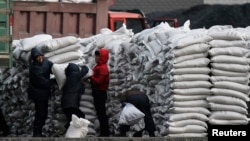Food distribution in North Korea has dropped to dangerous levels, according to a United Nation's food agency.
The country is distributing an average of 250 grams of daily food rations per person, a 21 percent decline from a three-year average, the U.N.'s Food and Agriculture Organization (FAO) said Monday.
The figure is less than half of the minimum amount recommended by the United Nations.
North Korea has been cutting food distribution since early July when it reduced the daily food rations to 310 grams per person. Later, the amount was reduced to the current level.
Cristina Coslet, FAO's Global Information and Early Warning System officer in charge of Far East Asia, told VOA this year’s drought affected the country’s crop production.
“The reason behind this decrease can be explained by the decrease in the early season crops,” said Coslet.
Coslet said the early season harvest accounts for 8 percent of the entire crop harvest, but it is an important food source for North Koreans.
Wheat and barley harvest fell 32 percent to 36,083 tons this year, according to the U.N. agency. Harvest of potatoes also fell about 20 percent to 232,889 tons.
The FAO official warned the country’s food situation could be worsened by the recent heavy rains that killed nearly 90 people and destroyed many homes.
Coslet said the agency received a request from North Korea for assistance in recovery efforts last month.
“We are currently exploring the possibility to get additional funds to provide agriculture input for the restoration of agriculture production system,” said Coslet.
North Korea’s crop production has often been affected by drought and floods, deepening the country’s food shortages which some experts say are the result of bad planning and poor policy.
Jee Abbey Lee contributed to this report, which was produced in collaboration with the VOA Korean service.




